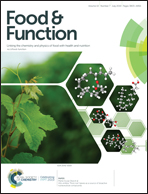An in vivo anti-tumor effect of eckol from marine brown algae by improving the immune response
Abstract
The anti-cancer activities of brown algae and some active extracts or components from brown algae have been demonstrated. But the anti-tumor activities of eckol, a new natural phlorotannin derived from marine brown algae, are poorly understood. In order to investigate the in vivo anti-tumor effect and its potential mechanisms of eckol in a sarcoma 180 (S180) xenograft-bearing animal model, S180 xenograft-bearing mice were randomly divided into 4 groups: model control, and eckol low-dose (0.25 mg kg−1), middle-dose (0.5 mg kg−1) and high-dose (1.0 mg kg−1) groups. After eckol administration, the tumor inhibition, tumor tissue histology, thymus index and spleen index were measured. The apoptotic tumor cells were detected using the terminal deoxynucleotidyl transferase mediated dUTP nick end labelling (TUNEL) assay. The protein expression levels of cleaved Caspase-3 and Caspase-9 (two key apoptotic proteins), Bcl-2 and Bax (two key anti-apoptosis-related genes), as well as epidermal growth factor receptor (EGFR, a well-known cell proliferation-stimulating molecule in tumorigenesis) and p-EGFR in tumor tissues were determined by western blot. A carbon particle clearance test, measurement of serum cytokine levels, a splenic T lymphocyte proliferation test, and T lymphocyte subpopulation analysis were used to evaluate the effect of eckol on the immune function of tumor-bearing mice. Moreover, CD11c+-dendritic cell (DC) infiltration in tumor tissues was detected by immunohistochemistry, and the surface molecules on bone marrow-derived DCs were analyzed using flow cytometry. The pro-apoptosis and anti-proliferation activities of eckol were manifested by the increased TUNEL-positive apoptotic cells, the upregulated Caspase-3 and Caspase-9 expression, and the downregulated expression of Bcl-2, Bax, EGFR and p-EGFR in eckol-treated transplanted S180 tumors. Most importantly, eckol stimulated the mononuclear phagocytic system, recruited and activated DCs, promoted the tumor-specific Th1 responses, increased the CD4+/CD8+ T lymphocyte ratio, and enhanced cytotoxic T lymphocyte responses in the eckol-treated animals, suggesting its potent stimulatory property on innate and adaptive immune responses. This study suggested that eckol might act as a functional food constituent derived from marine brown algae with a potential in vivo anti-tumor effect achieved by improving the immune response.



 Please wait while we load your content...
Please wait while we load your content...